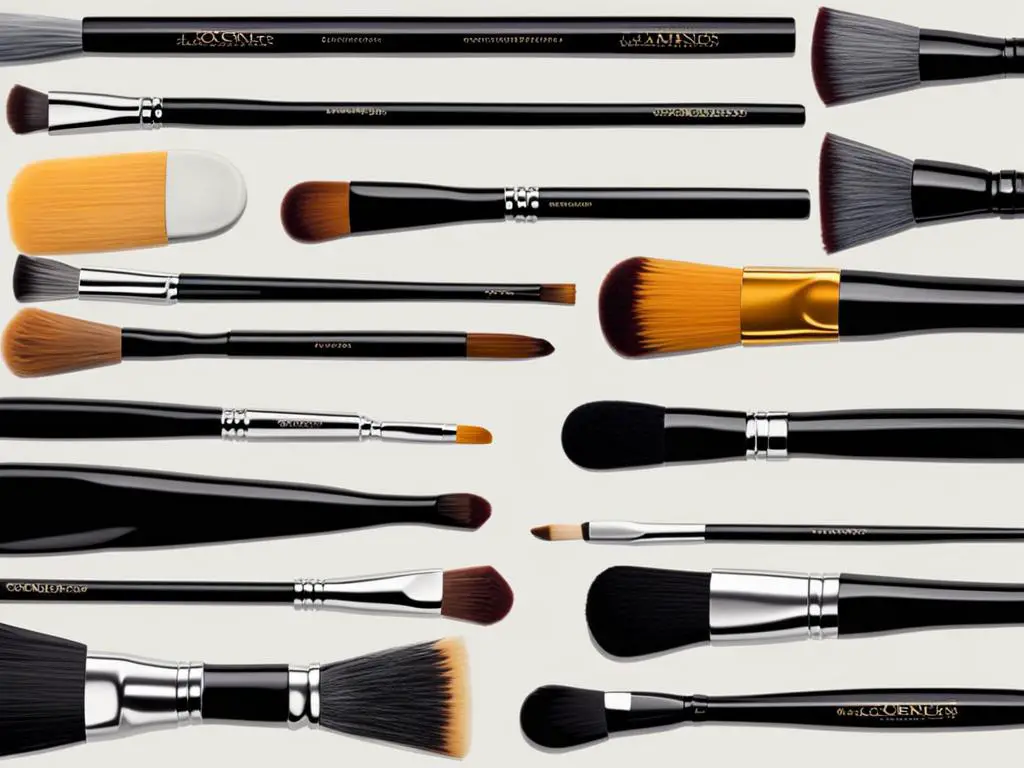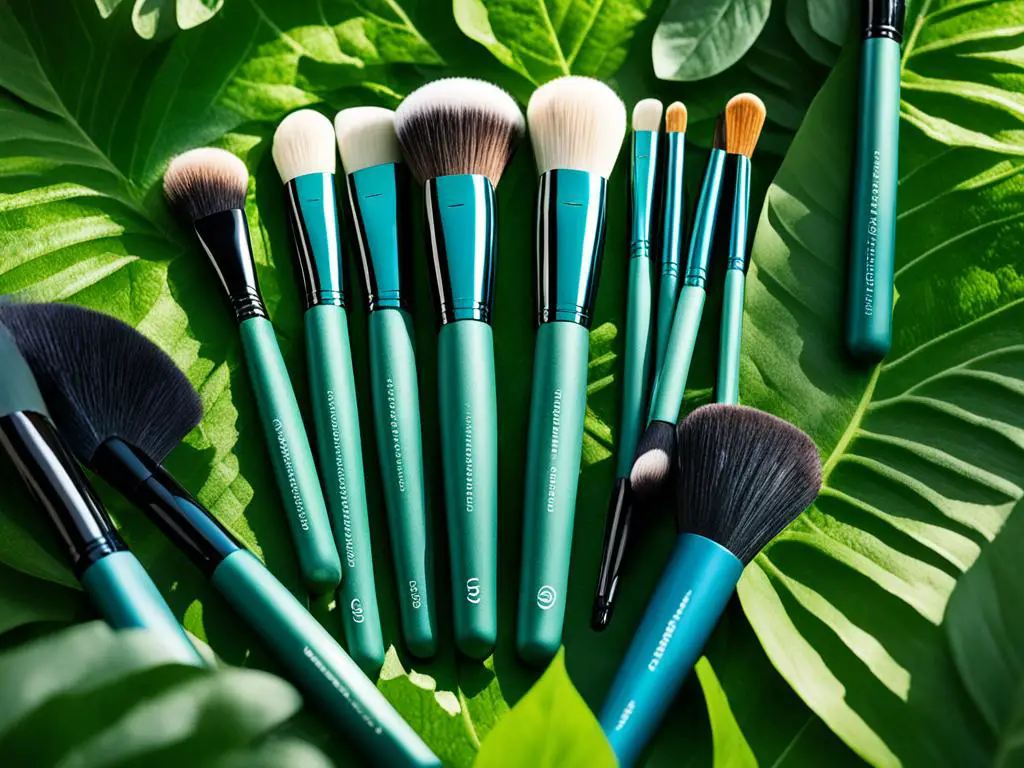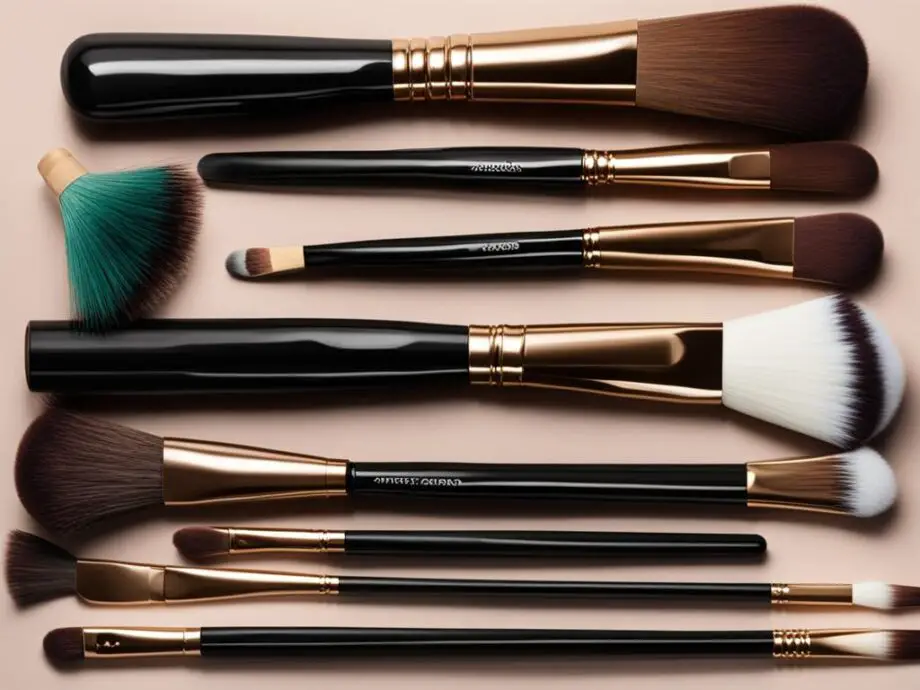Welcome to our comprehensive guide on natural vs synthetic makeup brushes. As the beauty industry continues to evolve, choosing the right tools for your makeup routine can be overwhelming. In this article, we will explore the differences between natural and synthetic brushes, their impact on the environment, and which option may be more suitable for your beauty needs.
Key Takeaways:
- Natural makeup brushes offer sustainable and cruelty-free options
- Synthetic brushes are versatile and non-toxic
- Your personal preference and beauty routine play a crucial role in choosing between natural and synthetic brushes
- Consider the environmental impact and opt for eco-friendly brush options
- Make an informed decision by considering factors such as sustainability, organic materials, and non-toxic choices
Natural Makeup Brushes: A Sustainable Choice
When it comes to choosing makeup brushes, opting for natural options can be a sustainable choice that benefits both the environment and your beauty routine. Natural makeup brushes are known for their cruelty-free manufacturing processes, organic brush materials, and overall sustainability.
Cruelty-Free Brush Options
One of the key advantages of natural makeup brushes is their cruelty-free nature. Many natural brush brands prioritize animal welfare and do not harm or exploit animals during the manufacturing process. This ensures that you can enjoy a guilt-free beauty routine with brushes that are ethically sourced.
Organic Brush Materials
An important aspect of choosing natural makeup brushes is the use of organic brush materials. While synthetic brushes are typically made from petroleum-based materials, natural brushes are crafted from sustainable and environmentally friendly materials such as bamboo, wood, and plant-based fibers.
These organic materials not only minimize the impact on the planet but also offer unique benefits. For example, natural bristles from animal hair, such as squirrel or goat hair, have superior blending and softness, allowing for effortless application and an airbrushed finish.
Sustainable Makeup Applicators
By opting for natural makeup brushes, you contribute to a more sustainable beauty industry. Natural brush brands often prioritize eco-friendly manufacturing processes, packaging, and materials. They strive to reduce waste, minimize their carbon footprint, and promote sustainable practices throughout their supply chain.

With a wide range of natural makeup brushes available in the market, you can find options that suit your needs, preferences, and beauty routine. Whether you’re a professional makeup artist or a beauty enthusiast, investing in natural brushes is a choice that aligns with sustainability and ethical practices.
Now that we’ve explored the advantages of natural makeup brushes, let’s dive into the versatility and non-toxic properties of synthetic makeup brushes in the next section.
Synthetic Makeup Brushes: Versatile and Non-Toxic
When it comes to makeup brushes, synthetic options have gained popularity due to their versatility and non-toxic properties. These brushes are not only effective in creating various makeup looks but also offer a sustainable solution for beauty enthusiasts.
Synthetic makeup brushes are made from man-made fibers, such as nylon, taklon, or polyester. Unlike natural brushes that are typically made from animal hair, synthetic brushes are cruelty-free and suitable for vegans, making them a compassionate choice for beauty lovers.
One of the key benefits of synthetic makeup brushes is their non-toxic nature. Unlike some natural brushes that may contain allergens or animal by-products, synthetic brushes are free from such concerns, making them a safer choice for individuals with sensitive skin or allergies.
“Synthetic makeup brushes offer the perfect combination of performance and ethics. They are a great choice for individuals who prioritize non-toxic and cruelty-free beauty tools.”
Moreover, synthetic brushes are incredibly versatile. They can be used with both powder and liquid products, allowing for seamless application of foundations, blushes, bronzers, eyeshadows, and more. The synthetic fibers are designed to pick up and distribute products evenly while offering excellent blending capabilities.
Additionally, synthetic brushes are relatively easy to clean and maintain. Since they are not made from natural hair, they do not absorb product or oils as much as natural brushes. This not only enhances their durability but also ensures a hygienic application every time.
Choosing synthetic makeup brushes also contributes to sustainable beauty practices. By opting for non-animal-based fibers, you help reduce the demand for animal hair and support eco-friendly alternatives. Furthermore, synthetic brushes are often more affordable than their natural counterparts, making them accessible to a wider range of beauty enthusiasts.
So, whether you are looking for a brush to achieve a flawless complexion or create stunning eye looks, consider investing in high-quality synthetic makeup brushes. Not only will you have a versatile and non-toxic tool in your beauty arsenal, but you will also play a part in promoting sustainable beauty practices.

| Advantages of Synthetic Makeup Brushes | Disadvantages of Synthetic Makeup Brushes |
|---|---|
| • Cruelty-free and vegan | • May have less hair-like texture compared to natural brushes |
| • Non-toxic and suitable for sensitive skin | • Less ability to hold and distribute powder products |
| • Versatile for use with both powder and liquid products | • May require more frequent cleaning due to product build-up |
| • More affordable compared to natural brushes | • Limited options in terms of softness and flexibility |
Deciding Factors: Personal Preference and Beauty Routine
When it comes to choosing makeup brushes, there are several factors that can influence your decision. Personal preference and your beauty routine play a crucial role in determining whether natural or synthetic brushes are the right choice for you.
Before making a decision, consider the following:
1. Natural vs. Synthetic Makeup Brushes:
Understanding the differences between natural and synthetic brushes can help you make an informed choice. Natural brushes are made from animal hair, while synthetic brushes are typically made from synthetic fibers such as nylon or taklon. Each type has its unique characteristics, which can affect their performance and feel. Natural brushes are known for their softness, ability to hold and blend powder products, and durability. On the other hand, synthetic brushes are often more suitable for liquid and cream products, as they do not absorb as much product and are easier to clean.
2. Personal Preference:
Consider your personal values and preferences when it comes to choosing makeup tools. If you prefer cruelty-free and vegan options, synthetic brushes are a great choice as they do not involve the use of animal hair. Natural brushes, on the other hand, may be preferred by those who appreciate the luxurious feel and craftsmanship associated with using animal hair.
3. Beauty Routine:
Your beauty routine can also impact your brush preference. If you mainly use liquid or cream-based products, synthetic brushes are often a better option as they provide a smoother application and are easier to clean. Natural brushes, with their ability to pick up and distribute powder products seamlessly, are often preferred by those who enjoy using mineral or loose powders.
4. Sustainability:
Considering the environmental impact of your beauty choices is also essential. Sustainable and eco-friendly beauty tools are becoming increasingly popular. Both natural and synthetic brushes have sustainable options available. Natural brushes made from sustainably sourced materials and synthetic brushes made from recycled or renewable materials are eco-conscious alternatives.
5. Budget:
Lastly, your budget may affect your decision-making process. Natural brushes tend to be more expensive due to the higher cost of sourcing and processing animal hair. Synthetic brushes, on the other hand, are generally more budget-friendly without compromising on quality and performance.
By weighing these deciding factors, you can determine whether natural or synthetic makeup brushes align better with your personal preferences, beauty routine, and commitment to sustainable beauty tools.
Now that we have explored the factors to consider, let’s take a closer look at the environmental impact of both natural and synthetic makeup brushes in the next section.
The Impact on the Environment: Eco-Friendly Brushes
When it comes to creating a sustainable beauty routine, choosing eco-friendly brushes is a crucial step. These brushes not only help reduce waste and minimize environmental impact but also promote the use of sustainable materials. Whether you opt for natural or synthetic brushes, there are plenty of eco-friendly options available that align with your green beauty values.
One of the key benefits of eco-friendly brushes is the use of sustainable materials. Many brands now offer brushes made from renewable resources such as bamboo, which is known for its fast growth and low environmental impact. By opting for brushes made from bamboo or other sustainable materials, you can enjoy guilt-free makeup application while contributing to a greener planet.
Additionally, eco-friendly brushes are often produced using ethical and environmentally responsible practices. Brands that prioritize sustainability typically ensure that their manufacturing processes are eco-conscious, reducing water usage and minimizing carbon emissions. This commitment to environmental stewardship further enhances the eco-friendly credentials of these brushes, giving you peace of mind as you beautify.
Emphasizing sustainability and ethical practices, eco-friendly brushes are the perfect choice for conscious beauty enthusiasts who want to look great while minimizing their ecological footprint.
Furthermore, eco-friendly brushes offer a durable and long-lasting alternative to conventional beauty tools. These brushes are designed to withstand repeated use and proper care, reducing the need for frequent replacements and thereby reducing waste. By investing in high-quality, eco-friendly brushes, you not only reduce your environmental impact but also save money in the long run.
Whether you prefer natural or synthetic brushes, eco-friendly options are available for both. Vegan brands offer a wide range of synthetic brushes made from cruelty-free materials, ensuring that no animals are harmed in the process. On the other hand, natural brushes made from sustainable materials provide a luxurious and eco-conscious option for makeup application.
By choosing eco-friendly brushes, you can enjoy guilt-free and sustainable beauty routines without compromising on quality or style. So, embrace the green beauty revolution and make a positive impact on the environment with your choice of brushes.

Conclusion
After exploring the differences between natural and synthetic makeup brushes, it becomes clear that both options have their advantages and considerations. For those looking for a sustainable and eco-friendly choice, natural makeup brushes are an excellent option. With their cruelty-free brush options and use of organic brush materials, they align with the values of conscious consumers.
However, synthetic makeup brushes also deserve recognition for their versatility and non-toxic properties. As sustainable beauty tools, they provide a reliable alternative for those with specific preferences or sensitivities. To make an informed decision, it’s crucial to consider personal preference and how each choice fits into your beauty routine.
Whether you choose natural or synthetic makeup brushes, it’s essential to be mindful of the environmental impact. Look for eco-friendly brushes that prioritize sustainability and minimize waste. By choosing green beauty brushes, you can contribute to a more sustainable beauty industry.
In conclusion, there is no definitive right or wrong when it comes to natural vs synthetic makeup brushes. It ultimately depends on your needs, values, and beauty routine. By assessing the organic brush materials, non-toxic brush choices, and sustainable makeup applicators available, you can find the perfect brushes that align with your eco-friendly and vegan lifestyle.
FAQ
What are the differences between natural and synthetic makeup brushes?
Natural makeup brushes are typically made from animal hair, such as goat, squirrel, or sable, while synthetic brushes are made from synthetic fibers like nylon or taklon. Natural brushes often offer a softer and more luxurious feel, while synthetic brushes are known for their durability and ability to apply liquid and cream products more effectively.
Are natural makeup brushes cruelty-free?
Natural makeup brushes can be cruelty-free if they are made from hair that is collected without harming the animal. Some brands source their natural brush materials through ethical practices, ensuring that no animals are harmed in the process.
Are synthetic makeup brushes non-toxic?
Yes, synthetic makeup brushes are non-toxic. They are usually made from synthetic fibers that are free from harmful chemicals. This makes them a great choice for individuals with sensitive skin or those who prefer to use non-toxic beauty products.
What are some organic brush materials used in natural makeup brushes?
Organic brush materials used in natural makeup brushes include bamboo, recycled aluminum, and sustainable wood handles. These materials are environmentally friendly and help reduce the carbon footprint of beauty products.
Can synthetic makeup brushes be considered sustainable beauty tools?
Yes, synthetic makeup brushes can be considered sustainable beauty tools. Since they are made from synthetic fibers, they do not require animal hair, which minimizes the impact on animals. Additionally, synthetic brushes tend to last longer, reducing the need for frequent replacements and waste.
How do I choose between natural and synthetic makeup brushes?
The choice between natural and synthetic makeup brushes ultimately depends on personal preference and your beauty routine. Natural brushes are ideal for applying powdered products, while synthetic brushes are better for liquid or cream-based products. Consider your desired results, skin sensitivity, and ethical preferences when making your decision.
Are there eco-friendly options available for makeup brushes?
Yes, there are eco-friendly options available for makeup brushes. Some brands offer brushes made from sustainable materials, such as recycled plastic or biodegradable materials. These brushes are designed to minimize environmental impact and promote sustainable beauty practices.
How can I ensure that my makeup brushes are vegan?
To ensure your makeup brushes are vegan, look for brands that explicitly state their products are vegan and do not use any animal-derived materials. These vegan makeup tools are created using synthetic fibers or alternative materials, ensuring no animals are harmed in the process.
